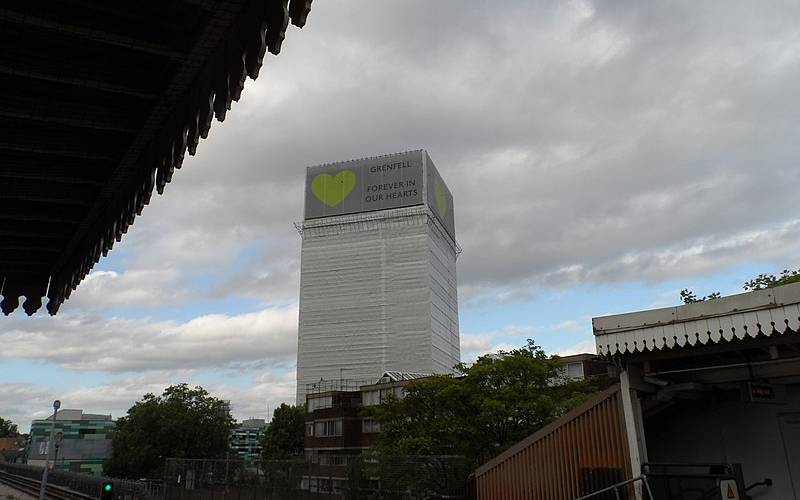Grenfell Inquiry seminar series

This series of seminars, hosted by the Bartlett School of Sustainable Construction in association with the School of History, Philosophy and Social Sciences, Bangor University, seeks to accompany the inquiry by discussing the key financial, economic, management and social phenomena in urban housing that led to the disaster in an academic setting.
The seminars will examine the key aspects of the climate and context in which the disaster occurred to try to extrapolate the wider implications and lessons for how urban housing is funded, managed, and supports the social and working lives of urban inhabitants.
Panel 1
Class, race, economic status and housing
Chair: Professor Peter Shapely
Friday 9 October 2020
- Papers and presenters
Alun Ephraim
Bangor University
Alun Ephraim is a doctoral candidate at Bangor University and is presently writing a thesis on Modernism and housing policy in postwar Birmingham, under the supervision of Dr Peter Shapely. He has a long-standing interest in the relationship between housing policies and wider social issues, and delivered a paper on the relationship between housing policy and anti-immigrant backlash politics in the 1960s at the Urban History Group’s 2017 conference.
Dr Eva Branscome
Bartlett School of Architecture, UCL
Before Grenfell: North Kensington’s slums and suburbs
Eva Branscome is a Lecturer at the Bartlett School of Architecture, UCL. Her research and teaching engage with the links between built heritage and cultural practices in contemporary cities. Her work concentrates particularly on the intersections of architecture and media, such as exhibitions, publications, and photography, as well as museum architecture as a cultural and urban hinge. These topics intersect with her extensive experience in British architectural heritage having spent a decade as a caseworker for the Twentieth Century Society.
Dr James Greenhalgh
University of Lincoln
Constructing the Unsuitable Tenant: the development of attitudes towards inhabitants of social housing since the 1920s
James Greenhalgh is a senior lecturer in history at the University of Lincoln, who specialises in the social and cultural history of nineteenth and twentieth-century Britain, with a particular focus on urban history, space and everyday experience. His work is particularly concerned with urban governance and, during the twentieth century, urban modernism and the redevelopment of cities either side of the Second World War. His first book Reconstructing Modernity examined this subject, looking at the development of policies designed to shape the built environment, both new and extant in Manchester and Hull, and the way these policies sought to regulate urban life and citizens’ behaviour. Similar concerns are also at work in his published articles on the provision of facilities on social housing estates, and in work on the domestic environment of the home in the Second World War. His latest project, funded by the Economic History Society, has examined the control of outdoor advertising as a facet of governmental policy and will be published as his second monograph by Palgrave in 2021.
Professor Miles Glendinning
The University of Edinburgh
A Curate’s Egg – Post-war Mass Housing in London
Miles Glendinning’s research sets out to combine in-depth investigations of subjects across thebuilt environment of the modern age (conservation, housing, architectural history, contemporaryiconic buildings) with a broad, cross-disciplinary overview perspective–all at an international levelrather than confined to a specific national ‘narrative’.Hismain research activity in the last 5 yearshas focused ever more intensively on theglobal history of mass housing (or public housing),encompassing both architectural and cultural-political aspects. This research strand isnot just ofwide-ranging historical interest, but alsohas relevance to current issues in the ‘politics’ of the builtenvironment, such as contemporary Chinese urbanisation. In parallel with this historical researchactivity, he is also pursuing wide-ranging ‘research impact’ initiatives, involving the building up ofpublic-access databases to disseminate images and other data accumulated in the course of hisresearch
Dr Sam Wetherell
University of York
A History of high-density council housing and race in Britain
Sam Wetherell is an urban historian of modern Britain who works at the University of York. His first book, 'Foundations: How the Built Environment Made Twentieth-Century Britain' will be published in October 2020 with Princeton University Press. The book looks at the rise, fall and reinvention of six types of urban space - the industrial estate, the shopping precinct, the council estate, the private housing estate, the shopping mall and the business park. These spaces tell the story of the emergence of a new kind of developmental state in mid-century Britain, and how it came to be displaced and reimagined in the 1980s and 1990s. He has also written on community arts, global neoliberal urban planning strategies, and the segregation of housing in Britain on the lines of race.
Sharda Rozena
University of Leicester
Sharda Rozena is a postgraduate researcher at the University of Leicester studying gentrification and facadism in Kensington, 1950 to 2022. A lifelong resident of Kensington, Sharda writes about her own auto-ethnographic experiences of living with the 'slow violence' of property management companies and landlords that had led to symbolic displacement. Conceptualising the idea of 'facadism' in gentrification scholarship, Sharda is also interested in residents' everyday experiences of home and community behind the many different facades in the borough.
Panel 2
Building regulation and deregulation
Panel chairs: Dr. Judy Stephenson, The Bartlett School of Sustainable Construction, and Sam Stein Q.C.
Friday 16 October 2020
Panel 3
The fundamental problem of co-ordination and procuring building services and contracts
Panel chairs: Dr Vanessa Davies and Michael Bowsher, QC
Friday 23 October 2020
- Papers and authors
Characterising (and closing?) the accountability-capability gap in complex public procurement
Dr. Richard Craven
University of Sheffield
Dr. Craven is a Senior Lecturer at the University of Sheffield, School of Law. His research interests concern the regulation of government procurement, including, in particular, legal compliance, non-commercial procurement objectives, and the role of the private sector in financing and delivering public services. Richard’s research is socio-legal, engaging with social research methods and economic sociology.
Dr. Jas Kalra
The Bartlett, UCL
Dr. Kalra is a Research Fellow in Supply Chain Integration and Business Models at Bartlett School of Sustainable Construction, University College London. His research interests are at the nexus of procurement, complex projects, and professional services. His research focuses on how organisations set-up and orchestrate inter-organisational networks to create and access assets, resources, and capabilities without owning them. Jas uses a variety of qualitative methods, such as case research, process studies, engaged scholarship, and qualitative content analysis of secondary data to study these issues.
Professor Michael Lewis
University of Bath
Professor Lewis is Professor of Operations and Supply Management at University of Bath’s School of Management in 2004. His research addresses questions of efficiency and effectiveness in various public and private sector service settings – from retail to home care services and management consultancy to nuclear storage. As part of the strong community of supply chain researchers at Bath, he also studies the management of complex relationships, contracts and projects. Awarded the Vice-Chancellor’s Research medal in 2017, he is currently a theme leader in the Cabinet Office/ESRC Project Excellence Initiative and an academic scholar in the Cornell Institute for Health Futures.
Professor Albert Sanchez-Graells
University of Bristol
Professor Sanchez-Graells is a Professor of Economic Law and Co-Director of the Centre for Global Law and Innovation at the University of Bristol Law School. Albert specialises in EU economic law and, in particular, competition and public procurement. Albert is currently researching the impact of digital technologies such as big data, machine learning, blockchain and the internet of things on public procurement governance, as well as functionally comparing developments in GovTech, RegTech and FinTech. Albert is a former Member of the European Commission Stakeholder Expert Group on Public Procurement. Most of his working papers are available at http://ssrn.com/author=542893. His analysis of current legal developments is published in his blog.
Dr. Mehrnoush Sarafan
University of Bath/ University of Cambridge
Dr. Sarafan is a Postdoctoral Fellow at HPC Supply Chain Innovation Lab, University of Bath and Research Fellow at University of Cambridge. Her research concerns the governance of interorganisational relationships in complex projects. In particular, Mehrnoush adopts a behavioural view to understand the effectiveness of formal and informal mechanisms used to govern exchange relationships. Mehrnoush uses a range of experimental methods (e.g. lab-based and scenario-based) to study these topics.
Dr. Rehema Msulwa
University of Bath
Dr. Msulwa is is a Post-Doctoral Research Associate currently working on the ESRC funded Project X and with HPC Supply Chain Innovation Lab at The University of Bath. Her research is interdisciplinary and focuses on the interplay between infrastructure provision, urban development and regeneration. In her work, Dr. Msulwa deconstructs complex action situations comprising socio-economic, technical, environmental and political dimensions into comprehensible juxtapositions of critical forces.
 Close
Close

